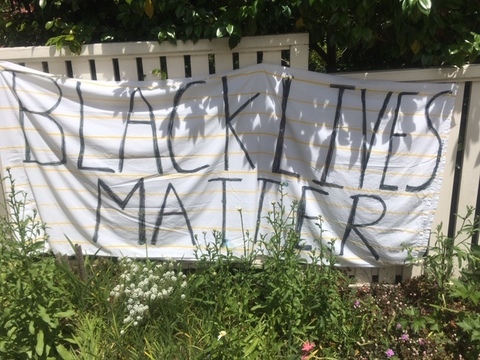
Photo by Tim Wagstaffe.
I used to think I was among the wokest of the woke. Naturally I wouldn't have said so aloud, but after all, I, a white woman, had married a Black man before that was even legal, nationally. Raised our biracial children. Trained anti-racist leaders. Published pro-equity books and op-eds. Marched and chanted.
But after May 25, 2020, when George Floyd screamed for his mama and people poured out of lockdown, something new broke open inside me. As well as inside everyone I know.
Black friends grew bolder. Scorched by racism all their lives they'd adapted, these successful women had perhaps grown a bit cautious. Now I'm watching folks I've known for decades become fervently political. They're expressing rage, loudly, plus their fierce pride.
I'm also changing. I've understood for years the "free pass" my white skin has always provided. As when I shoplifted, in my 20's, from Woolworth's, and clerks never gave me a second glance, so busy were they following people of color. "You have such an honest face," white people have told me all my life. Which I understand translates to: "Your blue eyes and blond hair make me feel safe. As if I know you."
That white skin was protection when a white cop pulled me over at twenty-eight for driving with an expired license, and ended up driving me home--without even issuing a ticket. Not yanking me out of my car and flinging me to the ground, as a policeman did to Sandra Bland, a Black woman, also twenty-eight, who ended up dead three days later in a jail cell.
So I knew that. But I'm noticing something new: a shocking sense of entitlement. This isn't about how differently I'm treated at our racial checkpoints. These feelings ooze up from inside. In the subtlest ways, I actually feel more entitled than people of color, more used to being ushered to the front of the line or asked to lead. I expect that I can break society's rules without significant consequences. And I'm so used to this privileged position I've forgotten it's a luxury everyone doesn't enjoy. Like the day my Black companion refused to climb an Oakland chain-link fence when candidate Obama was about to speak and I wanted us to get closer. Knowing my friend as a rebel, I insisted and was surprised she wouldn't jump the fence with me, forgetting, in my excitement, the vastly different treatment we'd get if caught.
White supremacy, I see anew, is a finely woven scrim of presumptions, layered deep, about how I can freely operate in the world. Perhaps even a subtle belief that it's my fine capabilities giving me that extra access. The feeling is as thin as gauze and as hard to catch, but when I glimpse it I see the subtle ways I assume good treatment. As should we all, but since some of us don't get it, what makes me think I deserve preferential care? And demand it when it is not forthcoming?
This sense of entitlement also leads me to automatically take charge, rather than sit back and listen to others' opinions. Once at Oakland women's choir rehearsal—where I was the only white member that evening, among a group of Black women--the director asked us to move our chairs to new positions. I suddenly heard myself directing other choir members, pointing, "Put those chairs over here for the sopranos." One alto, a friend, gave me the side eye.
"White people always have to be in charge, don't we?" I said to her, trying to cover my embarrassment with a light tone. "Hard habit to break."
She muttered, letting me know a "joke" wouldn't undo it.
After all these years, imagine my surprise as I realize at a deeper level how firmly I've bought the white superiority lie. No matter my politics, my close Black friends and family members, I share a cultural bias that slips into assumptions about myself and my relation to others.
It could hardly be otherwise. 400 years of discrimination have employed a self-justifying lie. That's why we have Black is Beautiful movements—to combat the myth of inferiority. Now I'm undergoing a mirror-image process for whites, digging deep, trying to root out those old supremacist habits. It's an internal task, one I thought I'd completed years ago, but I'm cycling through again as this era of racial reckoning reveals new layers of distortion.
I see now that claiming "wokeness' is itself a sort of smug self-congratulation, exactly the kind I'm determined to move beyond. Thanks to the Black Lives Matter Movement-- and all those who've risked lives and careers--for never giving up, pushing white allies into a deeper kind of work. We are at a milestone moment; there's no turning back.